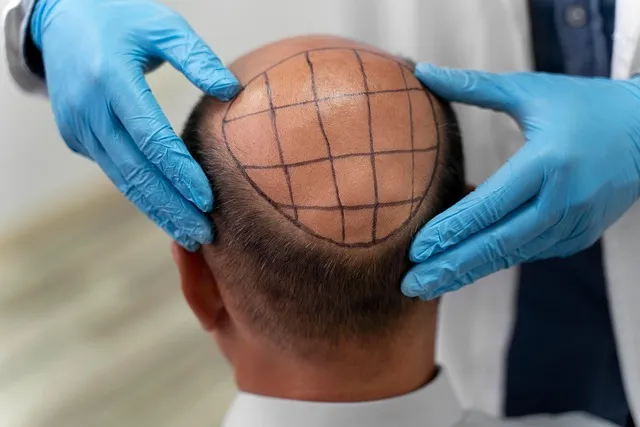Everyaday when you comb your hair, is there a tenderness in just one tender sore spot on head? Have you ever wondered why there is a tenderness in my scalp? In this blog, we will answer your question and help you get rid of it. Scalp tenderness can be a common condition, but knowing why it occurs is key to getting it treated on time. Here, we have broken down the reasons for that tender spot on top of head when touched and share easy solutions to help you feel better. Stay tuned!
What is Scalp Tenderness?
Before proceeding in this blog, let us make you clear why does my head hurt when I press on it so you will not get confused between headaches and scalp soreness.
So basically scalp tenderness is a very common condition that could happen to anyone irrespective of gender. It may lead to severe pain and a tender spot on top of head when touched. Different individuals can feel it differently. Here are some common symptoms of scalp tenderness.
- Scalp pain
- Throbbing
- Soreness
- Sensitivity
- Inflammation
Causes of Scalp Tenderness
Scalp tenderness could happen due to various reasons. Here are some common reasons listed:
- Dermatitis: It can cause dry skin, itching, and irritation on the scalp. It can be caused by genetics, an overactive immune system, and any type of allergies etc.
Treatment: Treatment may depend on the type of dermatitis. It includes over-the-counter medicines, shampoos which contain anti-allergic ingredients such as tea tree oil, topical corticosteroids (like fluocinolone), etc.
- Infection: A tender spot on top of head when touched can be caused by an infection called a pathogen. It includes viruses, bacteria, fungi etc. 3 types of scalp infection can cause tenderness on the scalp:
- Folliculitis: This is an infection of the hair follicles
- Furunculosis: It can affect both hair follicles and hair glands by developing oily substances.
- Carbunculosis: When boils or bumps occur under the scalp and cause irritation or tender spot on top of head when touched.
Treatment: Treatment of scalp infection may depend on the type of infection. For mild to moderate cases, you can try home remedies and over-the-counter medicines, etc. For more severe cases, you should consult your trichologist to drain the boils and bumps and get them treated properly.
- Psoriasis: In simple words, psoriasis is known as an extremely dry scalp, when a patch of skin becomes dry and scaly and makes the scalp very painful.
Treatment: There are a variety of treatments available for psoriasis. It includes certain medicines with the main ingredient dithranol to control the symptoms of tenderness in the scalp. Your trichologist may also suggest some shampoos or conditioners containing salicylic acid as a treatment for psoriasis.
- Temporal Arteritis: It is a condition when you feel severe inflammation or soreness in the temples (head area behind the eyes). It is a rare condition that affects mostly females over the age of 50.
Treatment: Typically it could be managed with over-the-counter medications. If you are diagnosed with this condition, you should get it treated on time. It could be a life-threatening condition.
Here are some common conditions that may also increase your scalp sensitivity and lead to scalp tenderness in one spot.
- Tight hairstyles: Even though sleek-high ponytails and buns are in trend, you should avoid opting for these tight hairstyles for prolonged periods. It can also lead to some severe complications such as traction alopecia. Traction alopecia is extreme hair loss due to inflamed hair follicles.
- Migraine: If your scalp is tender and hurts in one spot, it could be related to headaches, especially migraines. When you have a migraine, your nerves become very sensitive, causing what is called allodynia, a type of nerve pain. This sensitivity can make even a gentle touch on your scalp painful. It might be hard to wash, comb, or brush your hair because of this. Some people also feel pain when they try to rest on the side of their head which hurts when lying down.
- Scratching your scalp: If your scalp is inflamed or irritated, you may feel the urge to pick or scratch it, but prolonged scratching can give your scalp wounds and make scalp pain worsen.
How Is Scalp Tenderness Diagnosed?
During the diagnosis, the trichologist may ask you about the medical history, diet, routine, any scalp injuries etc. He/she may also ask you for a hair follicle sample for further testing.
- Scalp Biopsy: Your doctor may also suggest a scalp biopsy to determine the root cause of scalp tenderness. The doctor may take a small skin sample from the affected area.
- Imaging test: Your doctor may also ask you for an ultrasound or magnetic resonance imaging (MRI) may be used to pinpoint neurological causes, such as a pinched nerve.
What is the Treatment for Scalp Tenderness?
Treatment for scalp tenderness or soreness may vary depending on the underlying cause. In many cases, it can be managed with some over-the-counter medications, anti-inflammatory creams or ointments, shampoo/conditioner, etc containing salicylic acid and clobetasol.
What are the Home Remedies for Scalp Tenderness at One Spot?
For any disease, everyone wants to get it treated at home with home remedies. Here are some remedies you can try to get rid of scalp tenderness.
- You should be gentle with your hair. Use a broad tooth comb and detangle your hair easily.
- Use a mild, sulfate-free shampoo or hair-loss-free shampoo and conditioner to avoid irritation. Be gentle while washing and avoid pulling on your hair.
- Apply a warm or cold compress to the tender area for about 15 minutes. This can help reduce inflammation and ease discomfort.
- Some essential oils, such as lavender or peppermint oil, mixed with any hair oil, can be gently massaged into the scalp for soothing relief.
- Drink plenty of water to keep your body and scalp hydrated. Dehydration can contribute to scalp sensitivity.
- Tight hairstyles can pull on the scalp and worsen tenderness. Opt for looser styles to minimize irritation.
- Practice stress-reducing activities like meditation, deep breathing, or yoga. Stress can exacerbate scalp tenderness.
- According to NIH, Applying cold tea bags to the affected area can have a soothing effect due to the anti-inflammatory properties of certain teas.
- Apply a small amount of pure aloe vera gel to the tender area. Aloe vera has anti-inflammatory properties that may help calm scalp irritation.
- Make a paste using finely ground oatmeal and water, then apply it to the tender scalp. Oatmeal has anti-inflammatory properties that can provide relief.
- Reduce the use of heat styling tools like hair dryers and straighteners, as excessive heat can contribute to scalp discomfort.
*Note: Results with home remedies may vary for each individual. It is better to consult your trichologist before trying any new home remedy.
Benefits of a Healthy Scalp
Having a healthy scalp is important because if it is not healthy, there might be more than just a temporary problem. If your scalp feels a tender sore spot on head, it could be due to various reasons. Pay attention to your body, especially your scalp. If you have ongoing issues like a lot of itching, red patches, fungal infections, or headaches that do no get better with self-care, it is a good idea to see a doctor.
A good tip is to listen to your scalp it will give you signals about what it needs. Figuring out the right solution might take some time, but in the meantime, be kind to your scalp and take care of it.
Frequently Asked Questions
Why is my scalp tender at one spot?
Scalp tenderness can be due to various reasons, including tension, inflammation, or sensitivity to stimuli.
What can I use for a tender scalp?
Use a mild shampoo, apply a warm compress, or try essential oils like lavender for relief.
How to get rid of tender scalp fast?
Ease tenderness with gentle care, avoid irritants, and consider applying a cold compress.
Can I apply vaseline for tender scalp?
While Vaseline may moisturize, it's not typically recommended for a tender scalp; consider milder options like aloe vera.
Why does my scalp hurt to touch in one spot?
Scalp pain at one spot may result from inflammation, irritation, or nerve sensitivity.
Is scalp tenderness common?
Yes, scalp tenderness is relatively common and can be caused by various factors, including tension, infections, or skin conditions.

Reviewed by







